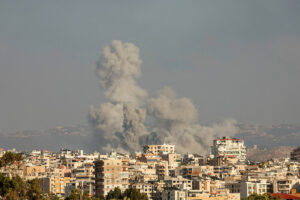Over 400 PHL repatriation applications pending in Lebanon
OVER 400 Philippine applications for repatriation from war-torn Lebanon have yet to be processed by authorities there, according to Manila, as Israel continued to launch airstrikes on its Middle Eastern neighbor. “We have around 413 pending (applications) — still to be processed by Lebanese immigration authorities,” Migrant Workers Secretary Hans Leo J. Cacdac said at […]

OVER 400 Philippine applications for repatriation from war-torn Lebanon have yet to be processed by authorities there, according to Manila, as Israel continued to launch airstrikes on its Middle Eastern neighbor.
“We have around 413 pending (applications) — still to be processed by Lebanese immigration authorities,” Migrant Workers Secretary Hans Leo J. Cacdac said at a news briefing on Thursday.
He said a total of 192 Filipinos in Lebanon were ready for repatriation and were booked in different commercial flights spanning Oct. 11 to 28. Eleven of them may arrive in the Philippines as early as the weekend, he added.
There are about 11,000 documented overseas Filipino workers (OFWs) in Lebanon.
Mr. Cacdac said the Philippine government had put up 179 temporary shelters for Filipinos in Lebanon.
“The capacity is not yet filled so definitely our four shelters can still accommodate some more stayers or occupants.”
Philippine President Ferdinand R. Marcos, Jr. on Wednesday held a Zoom conference with Cabinet officials on the repatriation of Filipinos from Lebanon, which has seen over 1,000 citizens killed and 1.5 million people displaced since Israel launched its ground incursion and intensified airstrikes earlier this month.
Mr. Cacdac said the Philippine government was eyeing to raise the Alert for Lebanon to Level 4, which would trigger mandatory evacuation.
He said many overseas Filipino workers were hesitant to be repatriated because of their nature of work.
“Most of our OFWs are domestic workers running up to nearly 100%, I would say about 98% of OFWs in Lebanon are domestic workers,” he said.
“Therefore, their places of work would be the employer’s households. So, they are, should I say, devoted to or in daily service of their respective employers,” he explained.
“They might have served long enough to have a sense of loyalty and commitment to serve and to work for their employer households,” he added. “The emotional ties may be a little stronger.”
He said it’s “almost similar” to the situation in Israel, where most OFWs were caregivers.
To address concerns on loss of income, Mr. Cadac said the Department of Migrant Workers and the Overseas Workers Welfare Administration — combined — are offering as high as P150,000 upon OFWs’ arrival in the Philippines.
“That’s good for four to six months’ salary.”
Israel has vowed to conduct raids against “Hezbollah terror targets” that it said were “immediate threat” to northern Israeli communities.
The group had said it was “ready for a direct confrontation with the enemy forces that dare or attempt to enter Lebanese territory and to inflict the greatest losses on them.”
The Philippine presidential palace on Wednesday said Israeli warplanes launched over 30 overnight air raids on the southern suburbs of Beirut on Oct. 6. But there were no reported injuries or casualties among Filipinos as of Oct. 7, it added, noting that the airstrikes were focused on southern Lebanon and the southern suburbs of Beirut.
The Philippines last month joined 123 other countries in favoring a United Nations resolution urging Israel to end its occupation of Palestinian territories within a year.
Israeli settlement activities involved the transfer of its nationals “into the occupied territories, the confiscation of land, the forced transfer of Palestinian civilians, including Bedouin families,” according to the November resolution.
The settlements also involved “the exploitation of natural resources, the fragmentation of territory and other actions against the Palestinian civilian population,” among other issues. — Kyle Aristophere T. Atienza
















